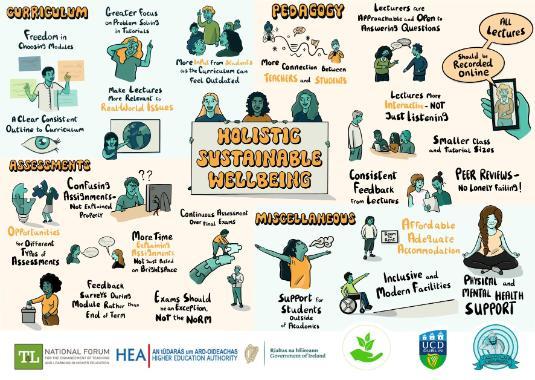Teaching for Sustainable Wellbeing in Higher Education through Curriculum, Assessment and Pedagogy
Overview

This Learning Enhancement project has been funded through SATLE (Strategic Alignment of Teaching and Learning Enhancement) with the support of the National Forum / HEA.
| PROJECT TITLE: | Teaching for Sustainable Wellbeing in Higher Education through Curriculum, Assessment and Pedagogy |
|---|---|
| PROJECT COORDINATOR: | Dr Gabriela Martinez Sainz, School of Education |
| COLLABORATORS: | Assoc Prof Amanda Fitzgerald, Dr Orla Kelly, Dr Graham Finlay, Prof Francesco Pilla, Dr Suja Somanadhan, Dr David Foster, Ms Sophie Carey, Jessica Surdey, Daniel Guigui, Francesca Pignolini, Aoife Keogh, Sara Lannin, Klara Carselin, Marta Darska |
| TARGET AUDIENCE: | Lecturers and tutors in Higher Education |
Background
There is growing recognition that higher education institutions must address both student wellbeing and environmental sustainability challenges that are increasingly interconnected. This is reflected in Ireland's Second National Strategy on Education for Sustainable Development (2023), which emphasises how educational organisations can promote social, economic, and environmental sustainability. Additionally, recent research from Jigsaw and the HSE highlights critical gaps in mental health promotion in Irish higher education, calling for a more integrated, whole-campus approach to student wellbeing.
The ‘Teaching for Sustainable Wellbeing in Higher Education’ project adopted a participatory approach to develop practical guidance for educators building upon a comprehensive review of existing evidence and practices with the collaboration with students as partners in teaching and learning. The project recognised the interconnected systems impacted by wellbeing and sustainability while seeking to explore ways in which such interconnections could be fostered in Higher Education.
Goals
Students are taught aspects of sustainable wellbeing in UCD modules on resilience, mental health, democracy, human rights, and environmental sustainability. However, how does module pedagogy (how we teach), assessment (how we evaluate) and curriculum (what we teach) impact students’ ability to develop wellbeing in themselves, others and the planet? Is there a gap between what we teach and how we teach it? These are the main questions the project explored.
The objectives of the project were:
- The co-creation of a model for Holistic Sustainable Wellbeing in Higher Education
- Examination of the teaching and learning opportunities to foster sustainable wellbeing in UCD.
- The development of a toolkit of different approaches that can be used to promote sustainable wellbeing through curriculum, pedagogy, and assessment at UCD.
All the objectives were envisioned as partnerships and collaborations with students, putting them at the forefront of the project as experts of their own experience.
Approach
The project was implemented as follows:
- We developed an integrated and multidimensional approach to wellbeing and sustainability that accounts for the interplay between individual, social, and environmental factors. We conducted a scoping review of international practices and literature on sustainable wellbeing in/and curriculum, assessment and pedagogy in collaboration with two graduate students.
- We mapped programmes and modules across UCD Colleges that address sustainable wellbeing -as a whole or aspects of it- to develop an overview of the learning ecosystem. This mapping exercise was conducted in collaboration with two graduate students.
- We investigated the students' experience related to sustainable wellbeing through a) an undergraduate survey (N=87); b) an interactive workshop with undergraduates (N= 112); c) an interactive workshop with undergraduate students in collaboration with the UCD Career Service (N=8); and d) a photo competition. All these initiatives were led by graduate students.
- We empowered graduate students to design and implement small-scale projects to explore sustainable wellbeing in UCD and ways in which it can be fostered through curriculum, assessment and pedagogy.
Results
Outcomes
A comprehensive approach to sustainable wellbeing in Higher Education to inform practices in curriculum, assessment and pedagogy.
A teaching framework to embed sustainable wellbeing in Higher Education with actionable insights for educators, resulting in practical tools and strategies that could be directly implemented in the classroom.
Identity building in sustainable wellbeing among undergraduate and graduate students as they reflected on how their experiences of teaching and learning intersect with their career development and sustainable wellbeing.
Deliverables
- Toolkit – comprehensive literature and strategies promote sustainable wellbeing through curriculum, pedagogy, and assessment at UCD.
- Podcast – conversations among UCD staff and students addressing key issues on fostering sustainable wellbeing in and beyond the classroom.
- Graphic recordings – developed from the workshops with students capturing their views and expectations regarding Holistic sustainable Wellbeing and how it could be fostered through the curriculum, pedagogy and assessment while studying at UCD and beyond.
- Mindfulness walks - developed in collaboration with the School of Nature and Life Sciences and UCD Estate Services, blending mindfulness and environmental awareness, the project creates an accessible, low-cost intervention to enhance sustainable wellbeing.